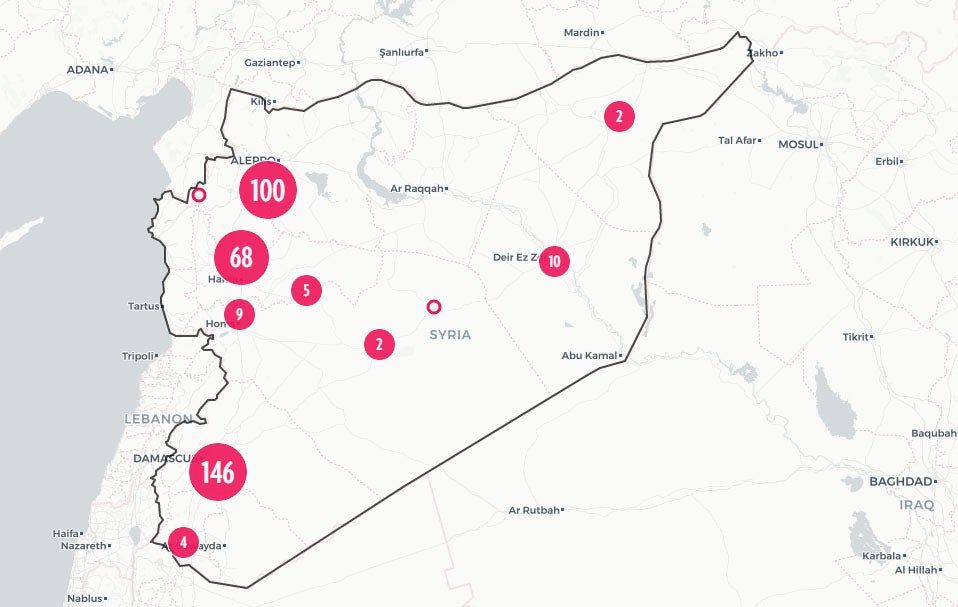Scale of Syrian chemical weapons campaign tracked
As the annual session of the global chemical weapons body reconvenes this week in The Hague, Netherlands, data gathered by the Berlin-based Global Public Policy Institute (GPPi) presents the scale of chemical weapon abuses in Syria, finding that Bashar al-Assad’s Syrian regime perpetrated the overwhelming majority of crimes.
The twenty-sixth session of the Conference of the States Parties (CSP) began on Monday, with representatives joining from the 193 member states committed to the Organisation for the Prohibition of Chemical Weapons (OPCW), formed in order to oversee compliance with the Chemical Weapons Convention (CWC) which prohibits the development, possession and use of chemical weapons.
The session seeks to review progress in implementing the CWC this year, and “mark the path forward for the coming year.”
Over a decade into the Syrian war, the international community is still attempting to curtail the Assad regime’s flagrant breaches of CWC obligations through its use of chemical weapons against its people, and to hold those responsible to account.
“Syria’s chemical weapons programme remains a grave concern,” Baroness Goldie, British Minister of State in the House of Lords, told the CSP on Monday. “The stark fact is that the Assad regime has killed hundreds of its own people with chemical weapons,” she said.
Ambassador Bonnie Jenkins, the US Under Secretary of State for Arms Control and International Security, stressed her faith that “the chemical weapons convention remains strong,” but called on the Assad regime to comply with their obligations under the CWC.
“We must hold the Assad regime accountable for its violations of the convention. The world has seen overwhelming evidence of numerous incidents of non-compliance… without accountability for the atrocities committed against the Syrian people, lasting peace in Syria will remain out of reach,” she told the session.
In May this year, the OPCW detected a “chemical warfare agent” in samples taken from a site in Syria, raising concerns that Damascus may have undeclared chemical weapon production activities.
Damascus has repeatedly failed to declare its use of toxic weapons and allow inspectors into the country, continuing to deny a visa to an OPCW weapons inspector, OPCW Chief Fernando Arias reported to the conference on Monday.
“To date Syria has not completed any of these measures,” Arias said, adding that its declarations “still cannot be considered accurate and complete”, and that he was arranging a meeting with Syria’s foreign minister to attempt to discuss the breaches.
The OPCW’s Investigations and Identification team’s second report was published in April 2021, concluding that “units of the Syrian Arab Air Force used chemical weapons in Saraqib on 4 February 2018.” The decision led to the OPCW stripping Syria of its voting rights.
In April 2020, OPCW investigators attributed three chemical attacks in 2017 to the Syrian government.
This June, Arias told the UN Security Council that its experts have investigated 77 allegations of chemical warfare in Syria, concluding that in 17 cases chemical weapons were likely or definitely used.
Contributing to wider understanding of such crimes in Syria, the GPPi’s interactive data portal sets out 349 instances of chemical attacks since first recorded in 2012; the most comprehensive dataset on chemical weapons in Syria to date, and one that reveals a much larger scale.
Analysis of 349 confirmed incidents, combined with extensive data on the conventional war and original interviews, also reveals the strategic logic of the Syrian chemical weapons campaign, according to the Institute.
Partnered with Syrian Archive, an organisation working to collect, preserve and verify hundreds of videos related to chemical weapons incidents in Syria, the GPPi’s dataset estimates that 1,961 people have died in chemical attacks since 2012 with the largest fatalities occurring in Sarin in 2013, which left almost 10,000 with injuries. Of the 349 cases of chemical weapon attacks, the GPPi attributes 334 to the Syrian government. Eight were claimed by Islamic State (ISIS), with the remaining 7 unidentified.
The GPPi concludes that, “the Syrian military’s use of chemical weapons is closely intertwined – logistically, operationally and strategically – with its conventional campaign of indiscriminate violence against civilian populations.” Although chemical weapons are responsible for only a small percentage of deaths in the country, “their psychological impact can be the straw that breaks the backs of even the most well-entrenched opposition communities.”
The Assad regime continues to deny its use of chemical weapons, citing “falsifying truths” and insisting that it handed over its weapons stockpiles under a 2013 agreement with the US and Russia, which was prompted by a suspected gas attack in the Damascus suburb of Ghouta that killed 1,400 people.
SOURCE: Rudaw
The views expressed in this article belong to the author and do not necessarily reflect the editorial policy of the Observatory.


